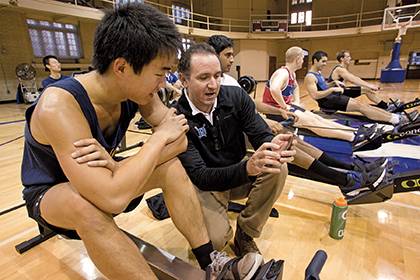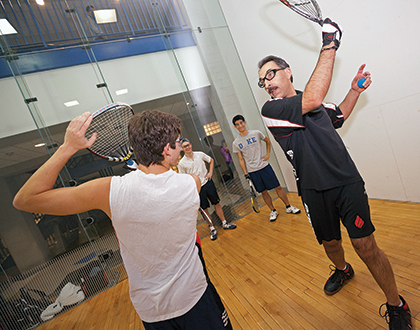Creating Bonds Outside the Classroom
Faculty and staff share passions by coaching Duke's student club sports

At 5:10 a.m. on a crisp fall morning, Jacques Bromberg's alarm beeped in his apartment just north of Duke's Campus. By 6 a.m., he was on the banks of Lake Michie in northern Durham County, climbing into a speedboat as 40 young men from the Duke club rowing team clambered into sleek racing shells and dipped their oars into the water. As they rowed, Bromberg motored alongside, offering instruction through a bullhorn.
Every weekday during the academic year, Bromberg, a visiting assistant professor of classics, coaches the rowing team before heading to the classroom. He is one of several faculty and staff who coach one of 37 club sports at Duke. Each year, more than 1,000 students compete against other collegiate teams through student-run club teams, which are open to athletes at all levels.
"For faculty or staff who get involved, it offers a chance to share a passion with students and create rich bonds outside the walls of academia," said Mike Forbes, director of sport clubs for Duke's Department of Recreation and Physical Education.
Mastering the lob-z serve

On a Monday, six students stood in a racquetball court in Wilson Recreation Center as their coach, Farshid Guilak, planted his feet shoulder width apart and positioned his racquet to demonstrate the technique behind a lob-z serve.
"The secret is locking your elbow and shoulder to get control and using the twist of your body to get the power," Guilak told the students.
He hit a ball at an angle toward the back wall, where it ricocheted, hit the left wall and then sailed across the court to a garbage can lid serving as a target.
After Guilak, professor of orthopaedic surgery and director of Duke's Orthopaedic Bioengineering Laboratory, lobbed a few balls into the target, each student stepped up to mimic Guilak's moves. They trust his instruction because they know his racquetball history: In 2009, he qualified for the U.S. Open Racquetball Tournament and was ranked 154th in the world on the pro tour.
"He's an awesome player," said junior Tim Lerow, team captain. "We are really lucky to learn from him."
Guilak has been coaching the club racquetball team at Duke since 2007. He offers two hours of instruction every Monday night during the semester and travels with the team to as many Mid-Atlantic Collegiate Racquetball Conference tournaments as his schedule allows.
To help players improve, Guilak sometimes brings in high-tech equipment from the laboratory. His radar gun has measured serve speeds of up to 140 miles per hour, and he has filmed players with a camera at 300 frames per second.
"Watching your body move at that speed, you can see exactly how you are bending or twisting when you hit the ball," Guilak said.
Guilak said he appreciates the opportunity Duke offers to mentor players through sport.
"If I just wanted to play racquetball, I could do that without coaching," he said. "But I learned so much about leadership and self-confidence playing racquetball in college that I want to recreate that experience here at Duke."
Staying connected to the game

Duke's ice hockey team was down one goal against the University of Miami when the second period ended.
As 11 Duke skaters headed to the locker room, the club team's assistant coach, Bill Trofi, pulled the last $20 from his wallet to buy Gatorade for the players. When he returned to the locker room with nine bottles, the players broke into wide smiles.
"It was like finding water in the desert," said junior Scott Martin, captain of the Blue Devil hockey team. "He's always doing things like that to help us out."
Trofi has been volunteering as assistant coach of the club hockey team since 2008. He balances family commitments and his full-time role as director of procurement for Duke University Hospital with a hockey schedule that can take eight to 20 hours each week.
The team practices and plays at the Orange County Sportsplex in Hillsborough, where home games against other Atlantic Coast Collegiate Hockey League teams often start at 10:15 p.m. Trofi's daughter, Jessie, who also works at Duke, usually accompanies her dad to games, helping with scoring and other logistics.
Trofi enjoys being part of a program that offers students a break from academic stresses. He also appreciates the opportunity to lace up his skates and glide out on the ice to run drills or scrimmage with the team.
"I've loved hockey since I was a kid in Rhode Island, and this is a great way to stay connected to the game," he said.
Martin, the team captain, said students respect Trofi for his support and dedication to the game.
"He's always there, at every game, every practice, talking to us and helping us out," Martin said. "Coaches like Bill make sports worthwhile because they make it about the people, not just the game."
'He draws out the best in us'
Before the first day of rowing practice in September, Jacques Bromberg, the classics professor and rowing club coach, sent team members a 10-page syllabus, modeled after the syllabus he uses for teaching Greek history.
Under the title "Rowers do more before 8 a.m. than most people do all day," the syllabus contained goals, expectations and a calendar of important dates. It also included dates when rowers would be required to row 6,000 meters on stationary ergometers to test fitness levels.
"I teach some of these kids, and I know how competitive they are," Bromberg said. "My job in the classroom and as coach is to channel that energy."
During a recent gym practice, Bromberg circulated among the rowers on stationary machines. He commented on form, encouraged speed and recorded slow-motion video with his phone to post to the team website for later review.
"The winter is when we learn to focus and fight through tired legs so that we can win races in the spring," Bromberg said.
This is Bromberg's second year with the team, and he is hoping the spring of 2014 will be as successful as his first. In 2013, as assistant coach, he led the novice team (rowers in their first year of rowing for Duke) to a gold medal at the Southern Intercollegiate Rowing Association.
"Coach Bromberg is the reason we won," said Andrew Gauthier, a Duke sophomore who joined the club last year despite knowing nothing about rowing. "He's incredibly dedicated, and he draws out the best in us."